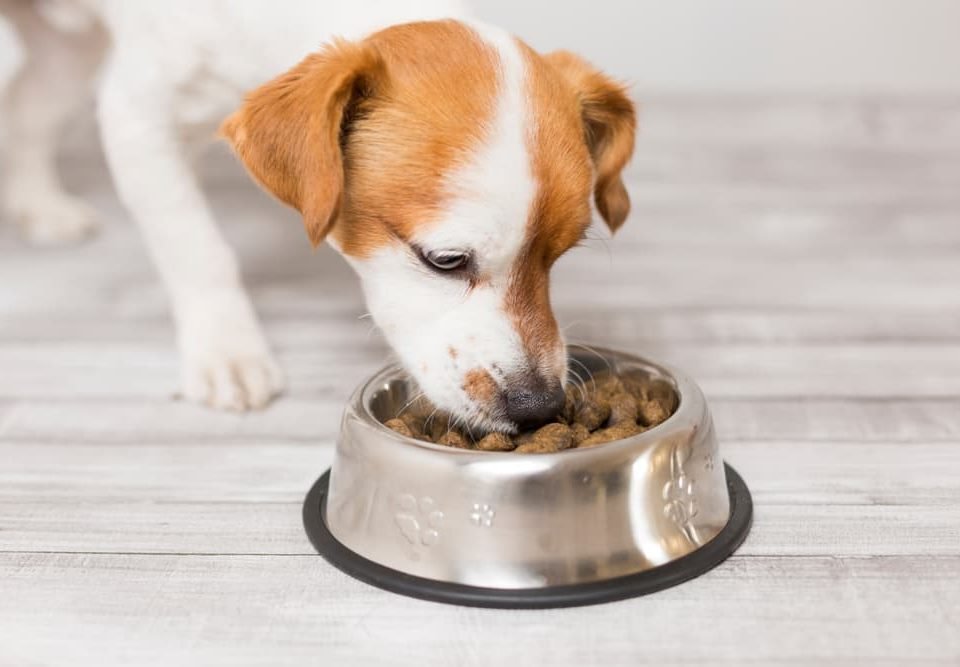Table of Contents
Keep Your Pup Happy with Nutritious Meals Every Day
Kibble bags and cans are confusing. Do you look at the nutrition information? The ingredients? How do you know what is really balanced for your dog?
When you need to choose a new food for your pet, it’s a difficult task, especially with so many options on the market, with every brand boasting that they’re the best and healthiest.
Instead of stressing about which dog food to buy to help keep your pet healthy, follow these tips to help guide your decision.
Opt for Formulations that Meet WSAVA Guidelines
The World Small Animal Veterinary Association (WSAVA) focuses on advancing the quality and availability of small animal medical care and creating a unified standard of care. As part of their mission, WSAVA sets forth global nutrition guidelines for household pets, including dogs.
These evidence-based guidelines are designed to help ensure pets get the nutrition they need, without endorsing any specific brand or manufacturer. This means you won’t find a WSAVA seal of approval on a bag of dog food, but you can read through the guidelines and find food that you know will meet your pet’s nutritional needs, simply by comparing information on the label.
Talk to Other Breed Owners About What They Feed
If you’re a fanatic about a specific breed, you can get good ideas about kibbles or canned foods that nourish your dog by talking to other owners, particularly those whose dogs exemplify the breed standard.
This is only helpful if your dog is a specific breed; if you’re adoptive mutt parents, this tip won’t be as valuable for you. However, you can still ask around your friend group about what type of food they feed their comparably-sized furry friends.
Take a Crash Course in Pet Nutrition
With so much misinformation about pet nutrition out there, especially thanks to recent “fad diets” for dogs – more on that later – it’s hard to know what’s fact and what’s fiction. Finding reputable online literature sources, such as veterinarians and licensed animal nutrition experts, is a must.
Weigh the validity of a source based on its writer’s credentials. For example, a licensed animal nutritionist has completed a degree in animal science or agriculture and has pursued licensure. A board certified veterinary nutritionist is another excellent resource.
Then, take a look at whether the website seems to be geared toward recommending a singular brand, or if they sell a specific brand on their website. If they do, the information they suggest may be biased.
Instead, look for evidence-based nutritional studies from peer-reviewed sources and experts whose credentials you can authenticate.
This way, when you read through all the information about pet nutrition you can get your hands on, you know that it’s relevant and reputable, and can help you guide your decision about which dog food to buy.
Don’t Fall for Fad Pet Diets
Grain-free or raw diets are great for dogs who need them, but they can do more harm than good for dogs that don’t. And raw or homemade diets, in particular, require the expertise of a veterinary nutritionist to formulate to ensure your dog’s nutritional needs are met.
In simplest terms, if a kibble or other dog food you’re considering makes bold, sweeping claims or excludes multiple types of ingredients, it could be difficult to discern whether it is healthy for your dog. In fact, in recent years, the Food and Drug Administration (FDA) has blamed grain-free diets heavy in peas, lentils, and other legumes, for growing rates of dilated cardiomyopathy (DCM) issues in dogs.
Tried-and-true pet food brands – not a new boutique food – are generally a safer bet for your pet.
Ask Your Veterinarian for Recommendations
You entrust your dog’s veterinarian to provide medical care, so why not entrust them to give advice on the best pet foods, too?
All veterinary schools require their vet students to complete courses in nutrition, and most major courses also include nutrition throughout them, too. So, to say a licensed veterinarian has no pet nutrition training is inherently false.
That said, your veterinarian has cared for many dogs and can give you a few recommendations for the types of food you should be feeding your pet to help promote long-term health. And no, you don’t have to buy the food directly from them.
Good Nutrition is Preventative Medicine!
Just like you’d make healthy food choices to keep your body in the best possible shape, healthy kibbles and canned food keeps your dog healthy, too.
Dogs with healthy starts in life tend to have fewer issues later, but it’s still not a bad idea to purchase dog health insurance, to help cover the cost of your pet’s veterinary care. The best pet health insurance companies can help save you major money should your treasured dog ever need treatment for an illness, emergency surgery, or other types of care.
So, in addition to finding the best dog food for Fido, be sure you shop around for the best insurance, too.










